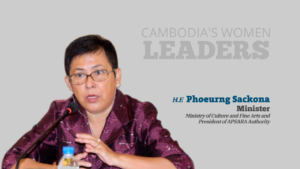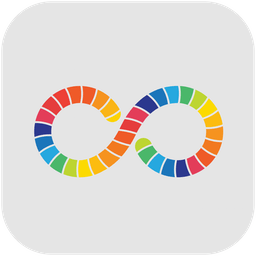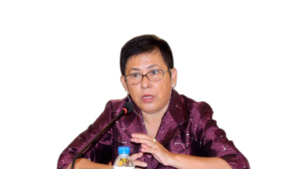
This is a single part of a series of stories of 21 women leaders of Cambodia. Download the full publication here.
Give a short introduction about your life (family, education, marital status) and how has your experience been as a leader and what achievements are you most proud of?
I grew up in Cambodia while the country was going through multiple political changes. My father was in the army and mother was a stay at home mom. Both of them shared a love for studies and it was very important for them to pass it on to their children. I had 3 siblings, all of whom I regrettably lost during the genocide, as well as losing my mother and my father. When the Khmer Rouge regime hit Cambodia, I was just finishing second grade. During this troubled time, no one in the country was allowed to pursue their studies. Education, arts and culture became forbidden. Nevertheless, having the chance to grow up for 16 years with 2 academic parents, I had never forgotten my love of study and never lost my thirst for knowledge. In the 1980’s, once the regime came to an end, I resumed my studies at the age of 20 and was selected for a scholarship to Russia where I graduated with a Master’s Degree in Chemical Engineering.
Once I graduated, knowing that I did not have the necessary passion to start a business, it was logical for me to pursue a career in the public sector. I decided to join the ITC (Institute of Technology of Cambodia) as a teacher where I was rapidly promoted to Deputy Director in 2000 and Director General in 2002 after getting my PhD in microbiology at the University of Bourgogne in France.
Being DG of ITC has opened up many opportunities for me, including being appointed Secretary of State of the Ministry of Education between 2008 & 2013. After this successful mandate, I was lucky enough to be chosen to lead the Ministry of Culture and Fine Arts in 2013. It is a privilege for me to work for the preservation of Cambodia’s heritage. I hope this will allow the younger generation to grow and respect our culture and to share it with the rest of the world.
When you first started out with your career, what were your most significant challenges?
As a woman, one of the main challenges during this period was to be taken seriously by men. It has been difficult, however, I never backed down from any challenges thrown in my direction. I have always believed in my ability to learn and grow. I was lucky enough to be surrounded by so many amazing people who continuously taught me new things and helped me adapt to new cultures.
Learning is a lifelong journey for women to know what is right.
Over the years, what valuable lessons have you learned as a leader?
During all my years of experience I have learned 3 important lessons:
- All effects have a cause. Solving any type of problem without focusing on its cause will not give you the right answer.
- Caring deeply for the people who work with you. Empathy and sympathy are two simple human emotions you require in order to care for everyone who works with you.
- As Lao Tsi once said, “Find a job you love, and you will never have to work a day in your life.” One’s job will always be more meaningful when it comes from love and passion.
What are your core values and how do you ensure your team/ staff/ family/ customers is aligned with your values?
- Believing in your team’s capacity is very important. By being their leader, you need to believe that your team has the necessary capacity to accomplish the mission you set for them.
- Being a humble leader. Being strict but respect rules and regulations, by also setting the proper example.
What are some of the behaviors or traits that you think are negatively impacting leadership?
- Aggressiveness
- Too much pride
- Being selfish
What are you doing to continue to excel as a leader (leadership tips in doing business and promoting women’s economic empowerment or gender equality)?
- Sharing my experiences and stories to help the younger generation to understand that not everything is given.
- Continuous learning while knowing that “Wealth without work – Commerce without morality” is not the proper way to live your life.
- Having the courage to open yourself to the unknown.
What are some of the biggest risks you’ve taken in your career and how did they turn out?
Being in the public sector is not like the private sector where you need to evaluate all types of risks in order to make sure you achieve a return on your investments. Nevertheless, being in the public sector, our actions are accountable to our country and our people and we always have to keep in mind the importance of our work.
My challenges come from one’s character and different principles in life.
For me personally, as a Buddhist, I strongly believe that any crisis is the equivalent of the storm. Once its passes life can begin again. You need to take the opportunity to use your past lessons in life as best as possible to help you move on.
What makes Cambodian culture unique and how do you think Cambodia can thrive in this age of entrepreneurship & dynamic leadership.
- Khmer’s heritage is unique. We should be proud of our culture and what our ancestors have given us.
- We need to learn from our past and not repeat the mistakes that we made previously as human beings.
- Enforce a ‘Win-Win’ policy by the Royal Government of Cambodia. Building peace and prosperity without internal conflicts where the people have to pay the price.
What advice do you have for young Cambodian female entrepreneurs?
- Women have their own value whether they are housewives, leaders, or businesswomen.
- Learning is a life-long journey for women to know what is right and what is wrong and pass it on to the younger generation.
- Failure is a good lesson which allows you to move forward.
- Khmer women have to understand our own culture and values. Be open to other cultures without forgetting our own.
© Copyright 2019
This is a joint publication by Woomentum and Konrad Adenauer Stiftung. Download the full publication here.

